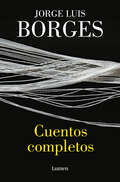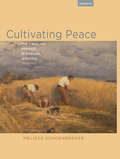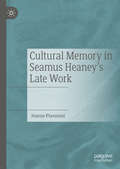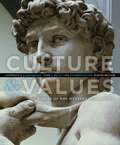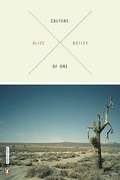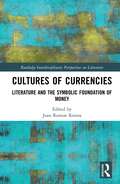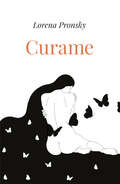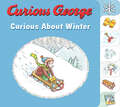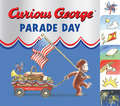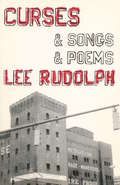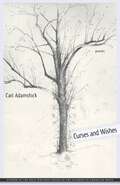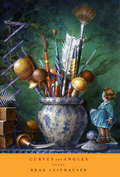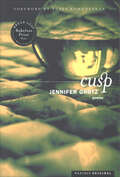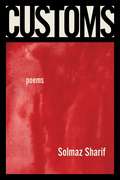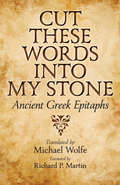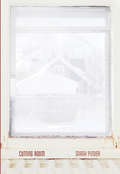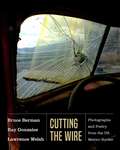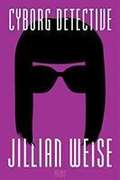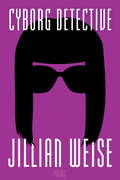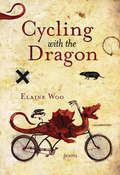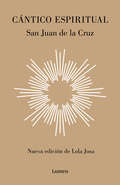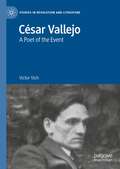- Table View
- List View
Cuentos completos
by Jorge Luis BorgesPoeta, ensayista y narrador, Borges es una de las figuras primordiales de la literatura universal. Ahora, por primera vez, se reúnen en este volumen todos sus cuentos, uno de los legados más influyentes y deslumbrantes de la literatura occidental.El universo borgiano, con sus espejos, laberintos, tigres, bibliotecas, gauchos, o máscaras, es ya uno de los paisajes fundamentales del siglo XX. En este libro se encuentran obras maestras como El jardín de los senderos que se bifurcan, Pierre Menard, autor del Quijote, Funes el memorioso, El Sur, El Aleph o Ulrica.Leer estos cuentos supone releer la historia de la humanidad y emprender una de las aventuras más enriquecedoras, bellas y emocionantes de todos los tiempos.
Cultivating Peace: The Virgilian Georgic in English, 1650-1750 (Transits: Literature, Thought & Culture 1650-1850)
by Melissa SchoenbergerDuring the decades following the English civil wars, British poets seeking to make sense of lingering political instabilities turned to Virgil’s Georgics. This ancient poem betrays deep ambivalences about war, political power, and empire, and such poets as Andrew Marvell, John Dryden, and Anne Finch found in these attitudes valuable ways of responding to the uncertainties of their own time. Composed during a period of brutal conflict in Rome, Virgil’s agricultural poem distrusts easy stability, urging its readers to understand that lasting peace must be sowed, tended, reaped, and replanted, year after year. Like the ancient poet, who famously depicted a farmer’s scythe suddenly recast as a sword, the poets discussed in Cultivating Peace imagine states of peace and war to be fundamentally and materially linked. In distinct ways, they dismantle the dream of the golden age renewed, proposing instead that peace must be sustained by constant labor. Published by Bucknell University Press. Distributed worldwide by Rutgers University Press.
Cultural Memory in Seamus Heaney’s Late Work
by Joanne PiavaniniCultural Memory in Seamus Heaney’s Late Work considers the ways that memory functions in Heaney’s poetry. Joanne Piavanini argues that the shaping of collective memory is one of Heaney’s major contributions as a poet. Locating Heaney in a transnational literary sphere, this book argues that his late work isdefined by a type of cosmopolitanism openness: the work moves beyond national identity to explore multiple allegiances and identifications. Moreover, Piavanini demonstrates that memory is a helpful lens to look at Heaney’s late work, in particular, because of the interplay of past, present and future in these works: in the construction of a collective memory of the Troubles; in the use of the elegy to commemorate the passing of important contemporary poets; in his writing on events with transnational significance, such as 9/11; in the slippages between past and present in poems about his family; and through the literary afterlives of texts—specifically, his appropriation of canonical classical texts. Drawing on approaches and concepts from memory studies, Piavanini considers Heaney’s late work to develop an analysis of poetry as a vehicle of memory.
Culture and Values: A Survey of the Humanities (8th Edition)
by Lois Fichner-Rathus Lawrence S. Cunningham John J. ReichCULTURE AND VALUES: A SURVEY OF THE WESTERN HUMANITIES takes you on a fascinating tour of some of the world's most significant examples of art, music, philosophy, and literature, from the beginnings of civilization to today. New features in the eighth edition are designed to make it easy for you to understand the influence of historical events and values on the works produced by each culture--guided discussions of all of the readings, chapter previews, timelines, "Compare and Contrast" sections, "Big Picture" reviews at the end of each chapter, and high-quality images with clear captions.
Culture of One
by Alice NotleyA new collection that captures the austere serenity of the Southwest American desert. Award-winning, Paris-based poet Alice Notley's adventurous new book is inspired by the life of Marie, a woman who resided in the dump outside Notley's hometown in the Southwestern desert of America. In this poetical fantasy, Marie becomes the ultimate artist/poet, composing a codex-calligraphy, writings, paintings, collage-from materials left at the dump. She is a "culture of one. " The story is told in long-lined, clear-edged poems deliberately stacked so the reader can keep plunging headlong into the events of the book. Culture of One offers further proof of how Notley "has freed herself from any single notion of what poetry should be so that she can go ahead and write what poetry can be" (The Boston Review). .
Cultures of Currencies: Literature and the Symbolic Foundation of Money (Routledge Interdisciplinary Perspectives on Literature)
by Joan Ramon ResinaThis book’s premise is not only the commonly accepted cultural relativity of economic concepts, but also the observation that the current shift in the meaning of concepts like “market,” “currency,” “exchange,” and “money” suggests that culture is undergoing a change with unpredictable economic and political consequences. The essays in the book raise basic questions concerning exchange – what is exchanged, who exchanges and how, which kind of currency is used, and indeed what is money and how does it convey and retain value over time. These issues are all classical objects of economic theory, but less often have they been approached from a cultural perspective. Works treating economic and monetary issues from a cultural perspective are few and far apart, and this book aims to contribute to such a perspective with a variety of approaches.
Curame
by Lorena PronskyEn Curame Lorena Pronsky nos invita a reflexionar acerca de cómo podemos transitar el camino que tenemos por delante sin desconocer jamás los dolores han dejado marcas en el alma, cada una de las heridas que nos atraviesan, y que nos señalan un nuevo destino. Luego de Rota se camina igual, su primer éxito, Lorena Pronsky vuelve a conmover al lector. Con su pluma sencilla y profunda, la autora sigue acompañando, sensible y amorosamente, la evolución emocional de miles de lectores que hacen eco de sus reflexiones. Curame, como dice Pronsky, es una invitación constante a resignificar las heridas inherentes de la vida. Un viaje de autodescubrimiento, aprendizaje y superación personal.
Curious George Curious About Winter (Curious George)
by H.A. ReySpend a snowy day with George in this picture book for preschoolers! Preschoolers will delight in exploring a typical winter day in this ebook featuring everyone's favorite monkey, Curious George. From shoveling to snow angels, coats to cocoa, little ones will enjoy a perfect day of winter play with Curious George in this ebook! Join George and the man with the yellow hat as they watch the first snowflakes fall, go sledding, and warm up by the fire in this book that incorporates age-appropriate concepts like counting, colors, and seek-and-find.
Curious George: Parade Day
by H. A. ReyThere’s nothing like waiting for something special and magical to happen. Today George is waiting for a parade to start! But before it does, this little monkey manages to find—and make—plenty of mischief. When the fun gets a little out of control, George must save the parade . . . but will it mean he misses a spectacular end to the day? Each spread features a short poem!
Curses
by Lee Rudolph"Lee's poems are like places. I enter them and he talks to me there. I hear his voice. The rare quality is how full these places seem of things and feelings but without crowding me. Rather they make me believe I'm really there. I like Lees poems a lot."--Dick Lourie
Curses and Wishes: Poems (Walt Whitman Award of the Academy of American Poets)
by Carl AdamshickThe unusual voice encountered in Curses and Wishes carries a quiet, slightly elevatedconversational tone, which flows from intimate secrets to wider social concerns. The poet has faith in economy and trusts in images to transfer knowledge that speech cannot. In Curses and Wishes the short, simple lines add up to a thoughtful book possessed with lyrical melancholy, a harmony of sadness and joy that sings: "May happiness be a wheel, a lit throne, spinning / in the vast pinprick of darkness." By the close of this ambitious work the poet has inspired readers to see the multifaceted effects of our human connections.
Curves and Angles
by Brad LeithauserIn his first collection since the widely acclaimedDarlington’s Fall, Brad Leithauser takes the reader on a bracing poetic journey. Curves and Anglesbegins in a warm, soft, populated world (these are the curves of the human body, as well as the elliptical pathways of human motivation), and it concludes in a cooler, sharper, more private place—the less-giving angles of an inanimate universe. The first section, “Curves,” introduces us to a couple of passionate young lovers, indoors in the city on a rainy afternoon; to a vociferous cluster of children playing on a Midwestern summer evening; to a godlike scuba diver, “all long gold limbs and a restless halo of long gold hair. ” In a pair of long poems, two aging men—one a science-fiction writer of the 1950s, the other a traveler in an airport bar—confront their mortality. “Angles” guides us to a rarely opened north-looking attic room, made brilliant by a nearby maple in full fall orange; to a sunny Louisiana kitchen, where two bowls—one brimming with semiprecious stones, one filled with seashells—are locked in an eternal silent beauty contest; to a frozen Icelandic lake; and to a narrow unmarked entryway that possibly leads to our “true and unbounded kingdom. ” Curves and Angleswanders from the balmy waters of the South Pacific to the crystalline wastes of the Arctic, unified throughout by an embracing love of the natural world in all its inexhaustible variety—whether lush or spare, peopled or solitary, curved or angled. It’s a journey made unforgettable by these wise and exuberant poems.
Cusp: Poems
by Jennifer GrotzEntre chien et loup — between dog and wolf. This French colloquialism for twilight informs Jennifer Grotz’s debut poetry collection, Cusp. A winner of this year’s Bakeless Prize for poetry, Grotz explores the peculiar territory of middleness — neither dark nor light, not quite familiar but not fully unknown. It is a place with its own dangers, its own knowledge: road signs in a French tunnel remind drivers of their headlights in the temporary darkness; a scratchy recording of the last castrato highlights art’s uneasy coupling of inspiration and artifice. Personal, thoughtful, inquisitive, and introspective, these poems reveal Grotz’s varied influences, from the “quilted fields” of west Texas to a jazz club in Paris, from a sexy rodeo rider to Jean-Jacques Rousseau. It is the dizziness of the foreign and the strangeness of what’s all around that gives Cusp its energy, its vitality, signaling the arrival of a distinctive new voice in American verse.
Customs: Poems
by Solmaz SharifFinalist for the 2023 Kingsley Tufts Poetry AwardFinalist for the 2022 L.A. Times Book Prize for PoetryLonglisted for the 2023 PEN/Jean Stein Book AwardIn Customs, Solmaz Sharif examines what it means to exist in the nowhere of the arrivals terminal, a continual series of checkpoints, officers, searches, and questionings that become a relentless experience of America. With resignation and austerity, these poems trace a pointed indoctrination to the customs of the nation-state and the English language, and the realities they impose upon the imagination, the paces they put us through. While Sharif critiques the culture of performed social skills and poetry itself—its foreclosures, affects, successes—she begins to write her way out to the other side of acceptability and toward freedom.Customs is a brilliant, excoriating new collection by a poet whose unfolding works are among the groundbreaking literature of our time.
Cut These Words into My Stone: Ancient Greek Epitaphs
by Michael WolfeThe lively ancient epitaphs in this bilingual collection fit together like small mosaic tiles, forming a vivid portrait of Greek society.Cut These Words into My Stone offers evidence that ancient Greek life was not only celebrated in great heroic epics, but was also commemorated in hundreds of artfully composed verse epitaphs. They have been preserved in anthologies and gleaned from weathered headstones.Three-year-old Archianax, playing near a well,Was drawn down by his own silent reflection.His mother, afraid he had no breath left,Hauled him back up wringing wet. He had a little.He didn't taint the nymphs' deep home.He dozed off in her lap. He's sleeping still.These words, translated from the original Greek by poet and filmmaker Michael Wolfe, mark the passing of a child who died roughly 2,000 years ago. Ancient Greek epitaphs honor the lives, and often describe the deaths, of a rich cross section of Greek society, including people of all ages and classes— paupers, fishermen, tyrants, virgins, drunks, foot soldiers, generals—and some non-people—horses, dolphins, and insects. With brief commentary and notes, this bilingual collection of 127 short, witty, and often tender epigrams spans 1,000 years of the written word. Cut These Words into My Stone provides an engaging introduction to this corner of classical literature that continues to speak eloquently in our time.
Cutting Carrots the Wrong Way
by Kobus MoolmanThe American poet C.D. Wright, in her collection Cooling Time – a fragmented mix of memoir, essay and poems – wrote the following: For decades the critical question has been, Can poetry survive? Is it mutable, profound, sentient, resplendent, intense, stalwart, brave, alluring, exploratory, piercing, skilful, percipient, risky, exacting, purposeful, nubile, mirth-provoking, affective, restive, trenchant, sybaritic, nuts enough? Can it still enkindle, prod, or enlarge us? And even if yes, yes to all of the above, is it enough? Among poets this inquiry is persistent. And if the answer is nay, all this and more is not enough, the question becomes, With what then will we hail the next ones, the ones who have to pick up around here after we’ve been chewing the roots of dandelions? This slim collection that you hold in your hand of poetry and prose about food has been written by “the next ones”. They are all postgraduate students from the Creative Writing programme in the Department of English Studies at the Univer¬sity of the Western Cape – a programme that covers the full range of postgraduate studies from Honours through to the Doctoral level. The collection is one of the outcomes of a partnership between the Centre for Excellence in Food Studies at UWC and the English Studies department. The part¬nership actively explores the social meanings of food and the ways in which these meanings are lived out through individuals, culture, the media and traditional sys¬tems. Such meanings, we argue, are better explored through a multi-disciplinary hu¬manities approach than through the strict biological and physical sciences. In this regard, the Department of English Studies and, in specific, the pro¬gramme of Creative Writing, has collaborated with the COE on a range of creative and practice-based research projects in order to better understand food systems as sites of cultural performance, social resistance and aesthetic expression. In this selection of work by some of the current creative writing students, I believe that “the next ones” are proving that writing can not just survive, but that it can in fact be relevant and resilient. Beginning in the seventies in South Africa, and extending into the eight¬ies, increasing emphasis was placed upon the need for artistic production to incorporate socio-political expression, that it reflects the historical context, and align itself with the progressive forces of resistance and change; in a word, that it be relevant. Collating material for this collection, I was struck by how the writers are ar¬ticulating an alternative notion of the term “relevant”. It is not that they eschew socio-political ideas (as part of a socially engaged institution of higher learning, students of UWC have an historical commitment to researching factors which inhibit socio-economic progress toward a more inclusive and equitable society). Rather, they are re-making the validity and consequence of the term by energis¬ing it with their own personal contexts and voices. This is, for me, as a teacher of creative writing, very significant. It shows that the students are connecting on an intimate level – the level of everyday lived experience – with not just writing as an imaginative, transformative act, but also with the idea that literature (that which they are ultimately participating in) be¬longs to them; that it can sound and look like them; that it can come from who and where they are. But the poems and short stories collected here are also acts of resistance. Wright, again in Cooling Time, argues that “If you do not use language you are used by it”. In a time where many lament the impoverishment of written expressive language (blamed on social media and the global shift away from text-based knowledge to the visual), “the next ones” are proving not just the resil¬ience of words – that words still matter and still mean – but also that words can be fashionable and even fun. That through their words – written in their own way to the best of their abilities – the next generation can dare to redeem their world; the b...
Cutting Room
by Sarah PinderCutting Room both describes and pushes against the anxious hum of the technologically saturated present. Sarah Pinder's poems navigate domestic and "natural" spaces as landscapes charged with possible violence and desire while they scan scenes as an outsider or camera eye to unsettle and fray familiar settings. Using hyper-focus and the long gaze, they draw the eye to the corners and seams of these spaces, slowing us down, shifting our focus to worn detail, asking us to seek pattern and possibility in a hyper-paced present tense. These are little ominous films, documenting the minutiae around us that can be our undoing.Let their ribs stretch out - there is no figurewhich is not also a ground inits arctic plane. Cutting rooms as luckwould have it have academic sincerity.Sarah Pinder was born in Sault Ste. Marie, Ontario, and lives in Toronto, Ontario. This is her first collection.
Cutting the Wire: Photographs and Poetry from the US-Mexico Border
by Ray Gonzalez Bruce Berman Welsh LawrenceCutting the Wire, a masterful collaboration between photographer Bruce Berman and poets Ray Gonzalez and Lawrence Welsh, offers us a way to look again, to really look, at the border between Mexico and the United States. Berman, who has photographed and lived in El Paso for decades, is a documentarian who uses his camera to record what&’s in front of him rather than for, as he puts it, &“mere self-expression.&” Berman&’s visual investigations of the everyday realities of the border—detention centers, smeltertown cemeteries, kids playing along a river levee, descanso crosses on telephone poles for the disappeared—are exactly the stuff the poetry of Gonzalez and Welsh is made of. The multilayered histories of the border landscape provide an inexhaustible supply of rich and fertile raw material for both Gonzalez and Welsh. But their poetic visions allow them to capture elements of a personal and collective past that historians have often failed to record.
Cyborg Detective (American Poets Continuum #174)
by Jillian WeiseIn her third collection of poems, Jillian Weise delivers a reckoning to the ableism of the Western Canon. These poems investigate and challenge the ways that nondisabled writers have appropriated disabled bodies, from calling out William Carlos Williams to biohacking Raymond Carver's "Cathedral" to chronicling the ongoing headlines of violence against disabled women. Part invective, part love poem, Cyborg Detective holds a magnifying glass to the marginalization and fetishization of disabled people while claiming space and pride for the people who already use technology and cybernetic implants every day.
Cyborg Detective (American Poets Continuum #174)
by Jillian WeiseIn her third collection of poems, Jillian Weise delivers a reckoning to the ableism of the Western Canon. These poems investigate and challenge the ways that nondisabled writers have appropriated disabled bodies, from calling out William Carlos Williams to biohacking Raymond Carver’s “Cathedral” to chronicling the ongoing headlines of violence against disabled women. Part invective, part love poem, Cyborg Detective holds a magnifying glass to the marginalization and fetishization of disabled people while claiming space and pride for the people who already use technology and cybernetic implants every day.
Cycling with the Dragon
by Elaine WooCycling with the Dragon is a personal investigation of family,love, culture, self, and the helpless feeling of "smallness." Elaine Woo's poems take the form of the words that they speak: she forms an "o" for the buoy that is a child's safety-raft (found in the solitude of a notebook and Harriet the Spy), and weaves a poem about fearing snakes and dreams into a descending slither.Woo's poems weave meaning with form, writing in a pastiche of diverse poetic voices who are small by virtue of age or status (be they women, children, ethnic minorities or the creatures of nature). And like tenacious seeds they break through to reach the sun, to face an abusive parent, bullies, the pain of shyness, envy, or racism.
Cyndy Szekeres' Hugs (Golden Board Book)
by Cyndy SzekeresBabies and toddlers love these first books—with bright, bold pictures and simple but interesting stories and concepts. Look for other titles and start a little board book library today.
Cytherea's Breath
by Sarah AldridgeEmma, establishing herself as a physician in early 20th century Baltimore, meets Margaret, a wealthy patron. Together they fight to be free in a society challenged by fights for women's suffrage, social reform, birth control and the practice of law.
Cántico espiritual: Nueva edición de Lola Josa a la luz de la mística hebrea
by San Juan De la CruzUN ACONTECIMIENTO EDITORIAL SIN PRECEDENTES La edición más completa, libre de la censura católica, del gran poema de la mística castellana Una cárcel denigrante fue el lugar donde se concibió, en 1578, Cántico espiritual, uno de los mayores poemas de la literatura occidental. Ahí permaneció encerrado fray Juan de la Cruz por querer reformar la orden de los carmelitas. Su carcelero le facilitó papel y tinta para escribir, así como aguja e hilo con los que el descalzo pudo coser mantas y trapos para fugarse, llevándose el cuaderno con las primeras treinta y una estrofas de las «Canciones entre el Alma y el Esposo» que había compuesto de memoria en la noche de su encierro. Mediante una metáfora erótica, el poema describía una profunda experiencia mística que se vinculaba con la tradición sapiencial hebrea, buscando la comunión con Dios a través del encuentro con la esencia de la palabra bíblica, tal y como habían propuesto Casiodoro de Reina, autor de la primera y prohibida traducción completa de la Biblia al castellano, o fray Luis de León, probable maestro de fray Juan en Salamanca. En esta nueva y reveladora edición, Lola Josa, especialista en el autor, ha fijado el texto a la luz de la mística hebrea sumergida en el poema, enmendando errores seculares de transmisión y proponiendo una revolucionaria interpretación que, libre de dogmas tanto religiosos como filológicos, da una nueva vida al poema y nos descubre un tesoro oculto de referencias, lecturas y desafíos. La crítica ha dicho...«De todos los hombres que han usado la lengua española para los fines de la poesía, san Juan de la Cruz es el más grande.»Jorge Luis Borges «Poesía es voz de lo inefable. A pocos poetas les ha sido dado tener esa voz. En España la tuvo san Juan de la Cruz.»Juan Ramón Jiménez «¿En qué reside la fuerza de su prodigiosa virtualidad estética que aún hondamente, exquisitamente nos perturba? [...] Es la palabra, el prodigio de la palabra desnuda, en toda su hiriente fuerza de expresión. [...] ¡Velocidad, condensación, desnudez expresiva, prodigio de la palabra en su nitidez original! [...] Quien así escribía, quien podía desarrollar un largo tema con este ímpetu y este refreno, con seguridad clásica y alta llamarada de espíritu, era un perfecto artífice literario.»Dámaso Alonso «San Juan escribió para sí mismo y para unas monjas. Y esa marginalidad le da una libertad que no tuvo ningún poeta culto de su tiempo. Le da la libertad de mezclar la tradición escrituraria, la tradición popular y la tradición grecorromana.»Jaime Gil de Biedma «Los místicos auténticos, como san Juan de la Cruz, describen la operación de la gracia en el alma con precisión de químico o de geólogo.»Simone Weil
César Vallejo: A Poet of the Event (Studies in Revolution and Literature)
by Víctor VichThis book argues that the poetry of César Vallejo announces the event, as a moment of irruption of a truth that destabilises the usual state of reality. It studies the emergence of a subject who affirms a truth that exceeds the law, interrupts hegemonic repetition, asserts universal solidarity, and defends "lost causes" despite political failure. The author reconfigures the traditional reading of Vallejo only as a poet of pain and human suffering, and offers new ways of understanding the relationship between poetry and politics.
